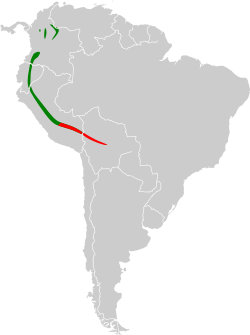| Mountain cacique | |
|---|---|
 | |
| Northern mountain cacique in Papallacta, Ecuador | |
| Cacicus leucoramphus - Northern Mountain Cacique | |
| Scientific classification | |
| Kingdom: | Animalia |
| Phylum: | Chordata |
| Class: | Aves |
| Order: | Passeriformes |
| Family: | Icteridae |
| Genus: | Cacicus |
| Species: | C. chrysonotus |
| Binomial name | |
| Cacicus chrysonotus d'Orbigny & Lafresnaye, 1838 | |
 | |
| Distribution map of Mountain Cacique. Green: C. c. leucoramphus and C. c. peruvianus; red: C. c. chrysonotus. | |
| Synonyms | |
Cacicus leucoramphus (Bonaparte, 1844) | |
The mountain cacique (Cacicus chrysonotus) is a species of bird in the family Icteridae. It is found in Bolivia, Colombia, Ecuador, Peru, and Venezuela.
Its natural habitat is subtropical or tropical moist montane forests.
It is sometimes split as:
- Southern mountain cacique (Cacicus (chrysonotus) chrysonotus)
- Northern mountain cacique (Cacicus (chrysonotus) leucoramphus)
